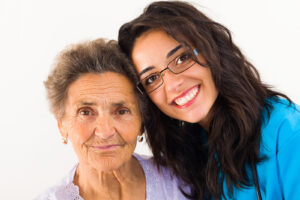Understanding Osteoporosis and What to Look for in Your Aging Loved Ones

Home care workers can help watch for signs of Osteoporosis.
It’s common knowledge that our bodies change in many ways as we get older, but some of those changes and conditions might catch seniors off guard. Osteoporosis is one of these conditions that is often not noticed until something significant occurs.
Osteoporosis is often called the “silent thief” because it weakens bones and makes them easily broken, often without seniors even knowing they’re at risk. While osteoporosis can happen at any age, seniors are especially at risk. For this reason, it’s important for them, their loved ones, and home care providers to understand the condition and what signs might indicate an increased risk.
What is Osteoporosis?
A diagnosis of osteoporosis means that the bones are more weak and brittle than normal, which makes them more likely to break, especially in the hip, spine, and wrist. This is because there is a loss of bone density over time, which makes the bones porous. The problem often gets worse without any obvious signs or symptoms until a fracture happens. This means that early diagnosis and prevention are very important, especially for seniors.
Why Are Seniors at Risk?
The various changes that senior bodies go through increase their risk of being diagnosed with osteoporosis. Along with changes in bone density, as mentioned above, muscle mass also naturally decreases, which can make the situation worse. Additionally, changes in hormones play a big role in the development of osteoporosis, especially in women after menopause. Finally, lifestyle choices like not being active enough, eating poorly, smoking, and drinking too much alcohol all raise the risk of osteoporosis and cause more bone loss.
Understanding the Importance of Early Detection
As mentioned, osteoporosis is often not found until there is a fracture, which not only causes a lot of pain but could also cause seniors to lose independence. Seniors can take steps to control and treat osteoporosis before it gets worse by paying attention to the first signs and symptoms. This is made easier with home care services on their side.
Some of the signs to look for include the following:
- Decreased Height: Compression fractures in the spine can happen because of osteoporosis, which causes a slow loss of height over time.
- Back Pain: Back pain that won’t go away, especially in the lower back, could be a sign of a spinal compression fracture.
- Fractures: Seniors with osteoporosis are likelier to break a bone, even in small accidents or falls. If seniors fall and break a bone, encourage them to ask the medical team about a bone density test to explore their continued risk.
Can Seniors Prevent Osteoporosis?
Beyond regular bone density testing, there are a few things that seniors can do to either prevent osteoporosis or slow it down:
- Focus on Nutrition: To keep their bones healthy, seniors need to eat a varied diet high in calcium and vitamin D. Home care providers can help them create meal plans that focus on getting the nutrition they need.
- Consistent Exercise: Walking, dancing, and resistance training are all weight-bearing routines that can help strengthen bones and lower the risk of breaking them. Again, home care workers can be a strong support for seniors, reminding them to get up and move during the day.
- Making Healthy Lifestyle Choices: For some seniors, giving up smoking and drinking less alcohol and caffeine can help maintain bone density.
Seniors can take charge of their bone health and lower their risk of fractures and other problems related to osteoporosis by understanding the condition, noticing any signs that might arise, and utilizing home care services to help them take preventive steps toward better health.
If you or someone you know needs help with Home Care in Kentwood, MI, contact Gauthier Family Home Care. We provide quality and affordable home care services in our community. Call us at (616) 560-4057 for more information.
Sources:
- https://www.niams.nih.gov/health-topics/osteoporosis
- https://www.webmd.com/osteoporosis/understanding-osteoporosis-basics
- https://www.mayoclinic.org/diseases-conditions/osteoporosis/symptoms-causes/syc-20351968
- Ensuring a Smooth Transition From Hospital to Home - June 4, 2025
- Caregiver of the Month – June 2025 - June 2, 2025
- Common Sense Summer Tips for Seniors to Help Them Beat the Heat - May 28, 2025

